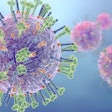
Stop dancing around with SARS-CoV-2 and take charge of the ongoing tango between viral mutations and human immune response, urged Dr. Margaret Liu at the September 27 plenary session at the American Association for Clinical Chemistry (AACC) 2021 meeting.
In her talk, Liu, the CEO of gene therapy delivery developer Pax Therapeutics and board chair of the International Society for Vaccines, said it can be helpful to think of the viral evolution of SARS-CoV-2 and host immune responses as a type of tango. A traditional tango dance features a leader and a follower who waits for the leader to initiate the next step.
Unfortunately, the virus seems to always be leading the dance. Liu told the AACC audience that it is time for humans to wrest control of the dance from the virus by immunizing everyone, improving virus surveillance and the use of diagnostics, and decreasing viral spread with masking and plain common sense. These steps will help control the COVID-19 pandemic even as the virus continues to mutate.
"Our behavior really continues to be important," Liu said. "I thank all of you [for] being careful ... in terms of both masking, immunization ... also because of what you do with your testing that makes such a big difference."
The tango: variants, vaccines, boosters
As it stands now, the delta variant is listed as "a variant of concern" -- the second highest designation of a variant by the U.S. Centers for Disease Control and Prevention (CDC). The agency assigns four levels of concern to variants, with most of the SARS-CoV-2 variants receiving the lowest designation: "being monitored."
What makes the delta variant so concerning is that it is more infectious than the alpha variant, which is more infectious than the original strain. Those infected with the delta variant have higher viral loads in the earlier stages of infection. Additionally, the delta variant is likely more infectious in asymptomatic people, and it can cause infections in vaccinated individuals, Liu said, adding that people with the delta variant have 1,000 times more virus particles in their upper airways.
But even in the face of the delta variant, Liu said that vaccination provides protection. In a study conducted from April to July 2021, people who were vaccinated in 13 U.S. jurisdictions had a five times reduced risk of infection and more than a 10 times reduced risk of hospitalization and death, according to the CDC.
Besides the delta variant, Liu said, we should be concerned about other variants around the globe, such as the gamma variant in Brazil, reminding the audience that the clinical efficacy rates of the vaccines are also affected by the strains.
"It's very important to not get a sense of complacency -- to say '... as long as we're OK and can get boosters against delta' -- because it may turn out that a new strain that's circulating elsewhere, or a new one that arises, can always come back and then potentially breach the immune response that we have from immunization," Liu said.
Will COVID vaccines need to be remade each year?
When the gamma and beta variants were first circulating in the U.S., there was concern that they would escape our immune responses, Liu said. "We had thought that we needed to have a different vaccine for all of these variant strains," she said.
This is the problem that bedevils influenza vaccines. Vaccines must be remade yearly against the currently circulating strains because they target the surface proteins of the virus and depend on antibody responses.
"The [flu] surface proteins ... actually change very easily and frequently," Liu explained. "And so since most of our vaccines for influenza generate antibody responses, they have to make a new vaccine every year, and they have to guess which vaccines will be important," she said.
Fortunately, it turned out that the COVID-19 vaccines approved in the U.S. had an advantage over the flu vaccines that made them more robust against variant strains; namely, they generate a robust immune response in the host that includes not just antibodies but also T helper cell and cytolytic T lymphocyte responses.
As for booster shots, Liu noted that a Pfizer-BioNTech booster has been authorized by the CDC for certain groups (e.g., people 65 or older). Moderna has submitted its data for a booster; Johnson & Johnson has not yet submitted data to the FDA (although the company has submitted results for publication), but it is anticipated they will request a booster authorization as well.
The CDC also has guidelines on its site for immunocompromised individuals who may require a third dose of either the Pfizer-BioNTech or Moderna vaccine.
Liu is on the scientific advisory board of the Jenner Institute at Oxford University that developed the AstraZeneca COVID-19 vaccine. She is also the scientific lead for the World Health Organization drafting group that is drafting guidelines for mRNA vaccines.



















